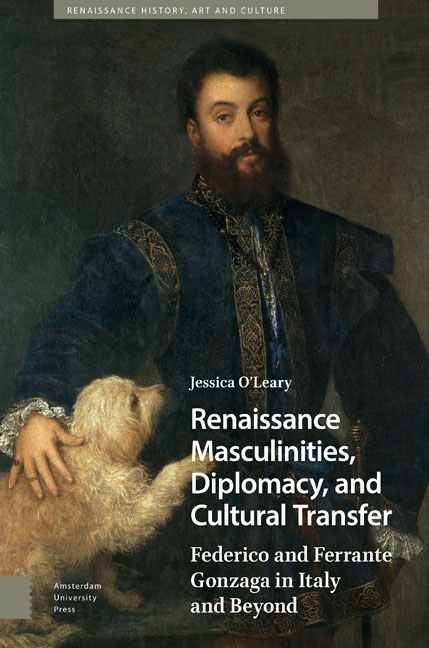 Renaissance Masculinities, Diplomacy, and Cultural Transfer
Renaissance Masculinities, Diplomacy, and Cultural Transfer Book contents
- Frontmatter
- Contents
- Acknowledgements
- Abbreviations
- Maps and Figures
- Introduction
- 1 Crisis Diplomacies in the Italian Wars
- 2 Warring Masculinities
- 3 Imperial Masculinities
- 4 Diplomacy of Magnificence
- 5 Imperial Networks and Loyalties
- 6 Interpretations of Renaissance Masculinities
- Conclusion
- Bibliography
- Index
5 - Imperial Networks and Loyalties
Published online by Cambridge University Press: 08 May 2024
- Frontmatter
- Contents
- Acknowledgements
- Abbreviations
- Maps and Figures
- Introduction
- 1 Crisis Diplomacies in the Italian Wars
- 2 Warring Masculinities
- 3 Imperial Masculinities
- 4 Diplomacy of Magnificence
- 5 Imperial Networks and Loyalties
- 6 Interpretations of Renaissance Masculinities
- Conclusion
- Bibliography
- Index
Summary
Abstract
This chapter analyses the involvement of both brothers in the military and cultural conflict between the Spanish Habsburgs and the Ottoman Empire in the Mediterranean. Prior to the outbreak of war on the peninsula in 1494, the Gonzaga were known to have regular trade connections with the Ottoman Empire, particularly with regard to horses, that became part of their dynastic identity. However, in 1535, Charles V defeated the Ottomans in Tunis, which led to an extraordinary propaganda campaign undertaken by the Emperor, with the assistance of families like the Gonzaga. The Gonzaga's policy shift to mirror that of Charles V was a further example of how smaller city-states balanced local cultural identities with survival politics in sixteenth-century Italy.
Keywords: Gonzaga, Conquest of Tunis, Habsburg-Ottoman War, Charles V, Cultural Transfer, Chapter Six
In the summer of 1535, Ferrante Gonzaga came to the aid of the imperial army who had just launched a successful eight-hour attack on the port of Halq al-Wadi (Goletta). Ferrante and his small garrison of Italian soldiers made the journey across the Sea of Sicily to northern Africa, arriving at Halq al-Wadi as Charles V finalised his plans for an attack on Tunis. Literally translated as “river's throat,” Halq al-Wadi sat on a narrow spit of land some 15 kilometres east of the capital, separated by the shallow lagoon of the city's lake. The imperial army would need to navigate along the lake's shores to reach the citadel of which the Greek-Ottoman corsair, Barbarossa, had seized control almost a year earlier. The arrival of Italian reinforcements energised Charles's squadrons and they launched a successful assault on the citadel. Within days, the imperial army had claimed the city of Tunis and its port.
The Italian captain almost immediately wrote to his brother, Cardinal Ercole Gonzaga, to deliver the felicitous news. The letter, dated July 28, 1535, was published in quarto (approximately 24 cm x 30.5 cm) in Rome by Antonio Blado (1490–1567), the official papal printer. Its circulation is unclear, but there are numerous surviving copies across Italian and European libraries, particularly in German-speaking territories where a German translation, “Warhafftige Newe Zeytung des Kayserlichen Sigs zu Thunis geschehen.
- Type
- Chapter
- Information
- Renaissance Masculinities, Diplomacy, and Cultural TransferFederico and Ferrante Gonzaga in Italy and Beyond, pp. 161 - 188Publisher: Amsterdam University PressPrint publication year: 2024


